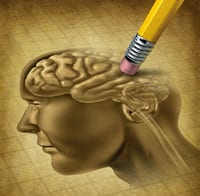
In fact, patients are five times more likely to have dementia with Lewy bodies if they experience a condition known as rapid eye movement (REM) sleep behavior disorder, compared to other symptoms associated with dementia, such as fluctuating cognition or hallucinations, the study found.
REM sleep behavior disorder is caused by loss of the normal muscle paralysis that occurs during REM sleep. It can appear three decades or more before a diagnosis of dementia with Lewy bodies is made in males, according to researchers.
The link between dementia with Lewy bodies and the sleep disorder is not as strong in women, researchers noted.
As part of the study, Mayo Clinic researchers examined MRI brain scans of 75 patients diagnosed with probable dementia with Lewy bodies. Using patient sleep data and the brain scans, researchers matched a definitive diagnosis of the sleep disorder with a definite diagnosis of dementia with Lewy bodies five times more often than they could match other risk factors used to diagnose the disease, such as loss of brain volume.
“While it is, of course, true that not everyone who has this sleep disorder develops dementia with Lewy bodies, as many as 75 to 80 percent of men with dementia with Lewy bodies in our Mayo database did experience REM sleep behavior disorder. So it is a very powerful marker for the disease,” said lead investigator Melissa Murray, PhD, a neuroscientist at Mayo Clinic in Florida.
The study’s findings could improve diagnosis of this dementia, which can lead to beneficial treatment, Murray added.
“Screening for the sleep disorder in a patient with dementia could help clinicians diagnose either dementia with Lewy bodies or Alzheimer’s disease,” she said. “It can sometimes be very difficult to tell the difference between these two dementias, especially in the early stages, but we have found that only 2 to 3 percent of patients with Alzheimer’s disease have a history of this sleep disorder.”
Once the diagnosis of dementia with Lewy bodies is made, patients can use drugs that can treat cognitive issues, although no cure is currently available, Murray said.




